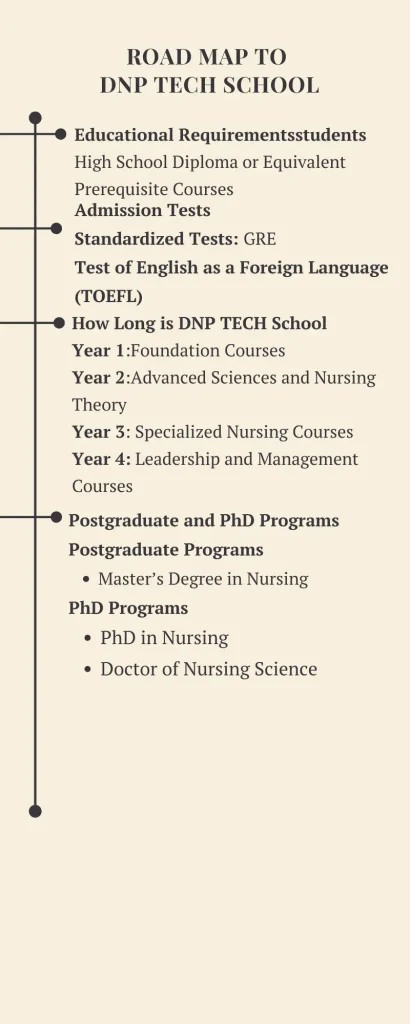How Long is DNP School
How Long is DNP School? DNP programs typically take 3-4 years to complete. This duration varies depending on whether the student is enrolled full-time or part-time. Some programs offer accelerated tracks, reducing the time. The time investment for a Doctor of Nursing Practice degree is essential for advanced clinical skills and leadership roles.
What is DNP School
DNP School, or Doctor of Nursing Practice School, is a higher education institution offering advanced nursing education. It focuses on clinical practice, leadership, and healthcare policy. Graduates are prepared to take on leadership roles in healthcare settings, improve patient outcomes, and influence healthcare policies.

DNP programs integrate evidence-based practice, quality improvement, and systems leadership into their curriculum. This prepares nurses to handle complex healthcare challenges. DNP graduates often work in advanced practice roles, such as nurse practitioners, clinical nurse specialists, nurse anesthetists, and nurse midwives, significantly impacting patient care and healthcare systems.
How Long is DNP School
Year 1: Foundation Courses
Foundation Courses: Introduction to nursing, basic sciences, and general education courses.
Clinical Practice: Initial exposure to clinical settings with basic patient care skills.
Key Skills: Development of foundational nursing skills, patient communication, and an understanding of healthcare systems.
Year 2: Advanced Sciences and Nursing Theory
Advanced Sciences and Nursing Theory: More in-depth study of anatomy, physiology, microbiology, and nursing theories.
Clinical Rotations: Increased hands-on clinical experience in various settings such as hospitals and community clinics.
Key Skills: Application of nursing theories in practice, advanced patient assessment, and critical thinking skills.
Year 3: Specialized Nursing Courses
Specialized Nursing Courses: Focus on specific areas of nursing such as pediatrics, maternity, mental health, and medical-surgical nursing.
Clinical Practice: Rotations in specialized nursing fields to gain diverse clinical experience.
Key Skills: Specialized patient care, interdisciplinary collaboration, and evidence-based practice.
Year 4: Leadership and Management Courses
Leadership and Management Courses: Introduction to nursing leadership, management, and healthcare policy.
Capstone Project: Completion of a capstone project or practicum integrating theoretical knowledge with practical experience.
Key Skills: Leadership, project management, and preparation for transition to graduate-level DNP studies.
Year 5: Transition to DNP Program
Transition to DNP Program: Preparatory courses for entering the DNP program, including advanced practice nursing, health informatics, and healthcare research.
Clinical Immersion: Intensive clinical rotations focusing on advanced practice skills and patient care management.
Key Skills: Advanced clinical decision-making, leadership in clinical settings, and preparation for DNP-level coursework.

How to Enter DNP School
Educational Requirements for DNP School:
Bachelor of Science in Nursing (BSN):
Completion of a BSN degree from an accredited nursing program.
GPA Requirements:
Minimum GPA requirement, typically around 3.0 or higher, depending on the program.
Nursing Licensure:
Active and unencumbered Registered Nurse (RN) license.
Clinical Experience:
Some programs require a certain amount of clinical nursing experience, often 1-2 years.
Entry Tests for DNP School:
Graduate Record Examination (GRE):
Some DNP programs may require GRE scores, though this requirement is becoming less common.
Test of English as a Foreign Language (TOEFL):
Required for international students whose first language is not English.
Application Process for DNP School:
Online Application:
Completion of an online application through the school’s website or a centralized application service like NursingCAS.
Transcripts:
Submission of official transcripts from all post-secondary institutions attended.
Letters of Recommendation:
Typically 2-3 letters from academic or professional references.
Personal Statement:
A written statement outlining career goals, reasons for pursuing a DNP, and how the program aligns with those goals.
Resume/CV:
Current resume or CV highlighting educational background, clinical experience, and any relevant certifications.
Interview:
Some programs may require an interview as part of the selection process.
Financial Aids for DNP School:
Federal Student Aid:
Available through FAFSA (Free Application for Federal Student Aid), including grants, loans, and work-study programs.
Scholarships:
Offered by universities, professional nursing organizations, and private foundations. Examples include the AACN’s Geraldine “Polly” Bednash Scholarship and the Nurses Educational Funds (NEF) scholarships.
Grants:
Federal and state grants for nursing students, such as the Nurse Corps Scholarship Program.
Employer Tuition Assistance:
Many healthcare employers offer tuition reimbursement programs for employees pursuing advanced nursing degrees.
Loan Repayment Programs:
Programs like the Nurse Corps Loan Repayment Program, which repays a portion of student loans for nurses working in underserved areas.
State-Specific Financial Aid:
Various states offer financial aid programs specifically for nursing students, such as the California State Loan Repayment Program.
Military Benefits:
Financial aid options for veterans and active-duty military personnel, such as the GI Bill.
Post Graduate and PhD Programs for DNP Graduates
Post-Master’s Certificate Programs:
Specializations: Advanced practice nursing specialties such as Nurse Practitioner, Clinical Nurse Specialist, Nurse Anesthetist, and Nurse Midwife.
Duration: Typically 1-2 years.
Focus: Further specialization and certification in a specific area of nursing practice.
PhD in Nursing:
Focus: Emphasis on nursing research, academic leadership, and theoretical foundations.
Duration: Usually 3-5 years.
Career Paths: Academic faculty, research scientists, healthcare policy makers, and administrative leadership.
Doctor of Nursing Science (DNS/DNSc):
Focus: Research-intensive programs aimed at improving healthcare outcomes through evidence-based practice.
Duration: 3-5 years.
Career Paths: Academic and clinical research roles, healthcare administration, and policy development.
Doctor of Education (EdD) in Nursing Education:
Focus: Preparing nurse educators for academic and clinical teaching roles.
Duration: 3-4 years.
Career Paths: Academic faculty, curriculum developers, and educational leadership in nursing schools.
Doctor of Public Health (DrPH) in Nursing:
Focus: Public health nursing, healthcare policy, and community health.
Duration: 3-4 years.
Career Paths: Public health leadership, policy advocacy, and community health program directors.
Top 10 DNP Schools

Johns Hopkins University – School of Nursing:
Known for its rigorous curriculum and strong emphasis on clinical practice and leadership.
Duke University – School of Nursing:
Offers various DNP tracks with a focus on evidence-based practice and healthcare innovation.
University of Washington – School of Nursing:
Renowned for its research and advanced practice nursing programs.
University of Pennsylvania – School of Nursing:
Provides comprehensive DNP programs with opportunities for interdisciplinary collaboration.
Columbia University – School of Nursing:
Emphasizes advanced clinical practice, leadership, and healthcare policy.
Vanderbilt University – School of Nursing:
Offers a wide range of DNP specialties and a strong focus on personalized education.
University of California, San Francisco (UCSF) – School of Nursing:
Known for its research excellence and leadership in nursing education.
University of Michigan – School of Nursing:
Combines advanced practice nursing with leadership training and innovative research.
Rush University – College of Nursing:
Offers a flexible DNP program with a strong focus on clinical practice and healthcare systems management.
University of Pittsburgh – School of Nursing:
Provides robust DNP programs with an emphasis on advanced practice, research, and leadership.
These schools are recognized for their excellence in nursing education, clinical training, and research opportunities, making them top choices for aspiring DNP students.
Factors Affecting the Length of DNP School:
Program Type:
BSN-to-DNP Programs: These programs typically take 3-4 years to complete, as they include both advanced nursing practice coursework and DNP-level courses.
MSN-to-DNP Programs: These programs usually take 1.5-2.5 years, as they build on existing advanced nursing practice knowledge and focus on leadership, policy, and advanced clinical skills.
Enrollment Status:
Full-Time Enrollment: Full-time students can complete DNP programs more quickly, generally within the standard 3-4 years for BSN-to-DNP and 1.5-2.5 years for MSN-to-DNP.
Part-Time Enrollment: Part-time students often take longer to complete their DNP, potentially extending the program by 1-2 years or more, depending on the individual’s pace and workload.
Specialization and Clinical Hours:
Specialty Tracks: Some DNP tracks, such as Nurse Anesthetist or Nurse Practitioner specializations, may require additional coursework and clinical hours, extending the program duration.
Clinical Practicum Requirements: The number of required clinical hours can affect the program length, especially for students who need more time to complete these hours due to work or personal commitments.
Accelerated or Extended Programs:
Accelerated Programs: Some schools offer accelerated DNP tracks that allow students to complete their degree in a shorter time frame through intensive coursework and clinical rotations.
Extended Programs: Conversely, some programs offer extended timelines to accommodate working professionals, which can lengthen the time to completion.
Credit Transfer and Advanced Standing:
Transfer Credits: Students who can transfer graduate-level credits from previous coursework may shorten the length of their DNP program.
Advanced Standing: Some programs offer advanced standing for students with significant clinical experience or previous graduate education, reducing the time required to complete the degree.
Individual Pace and Course Load:
Personal Pace: Each student’s individual pace and ability to manage the course load can impact the length of the program. Those who can handle a heavier course load may complete the program faster.
Work and Personal Commitments: Balancing work, family, and personal commitments can influence the time needed to complete the program. Students with fewer outside commitments may progress more quickly.
Program Format:
Online vs. On-Campus: Online programs may offer more flexible scheduling options, allowing students to complete coursework at their own pace, potentially shortening or lengthening the program based on individual circumstances.
Hybrid Programs: Programs that combine online and on-campus components may offer a balance of flexibility and structured learning, impacting the program’s duration.
Understanding these factors can help prospective DNP students plan their educational journey and choose a program that aligns with their career goals and personal circumstances.
Final Verdict
The length of a DNP program is influenced by various factors including program type, enrollment status, specialization, and individual pace. Understanding these factors can help prospective students make informed decisions about their educational journey and career goals.
FAQs
1.What is the typical duration of a DNP program?
DNP programs usually take 3-4 years for BSN-to-DNP students and 1.5-2.5 years for MSN-to-DNP students.
2.Can I complete a DNP program part-time?
Yes, many programs offer part-time options, but this can extend the duration by 1-2 years or more.
3.Are there online DNP programs available?
Yes, many institutions offer online or hybrid DNP programs, providing flexibility for working professionals.
4.What clinical hours are required for a DNP program?
The required clinical hours vary by specialty but typically range from 500 to 1,000 hours.
5.Can previous coursework or experience shorten my DNP program?
Yes, transferring graduate credits or having advanced standing based on clinical experience can reduce the program length.
